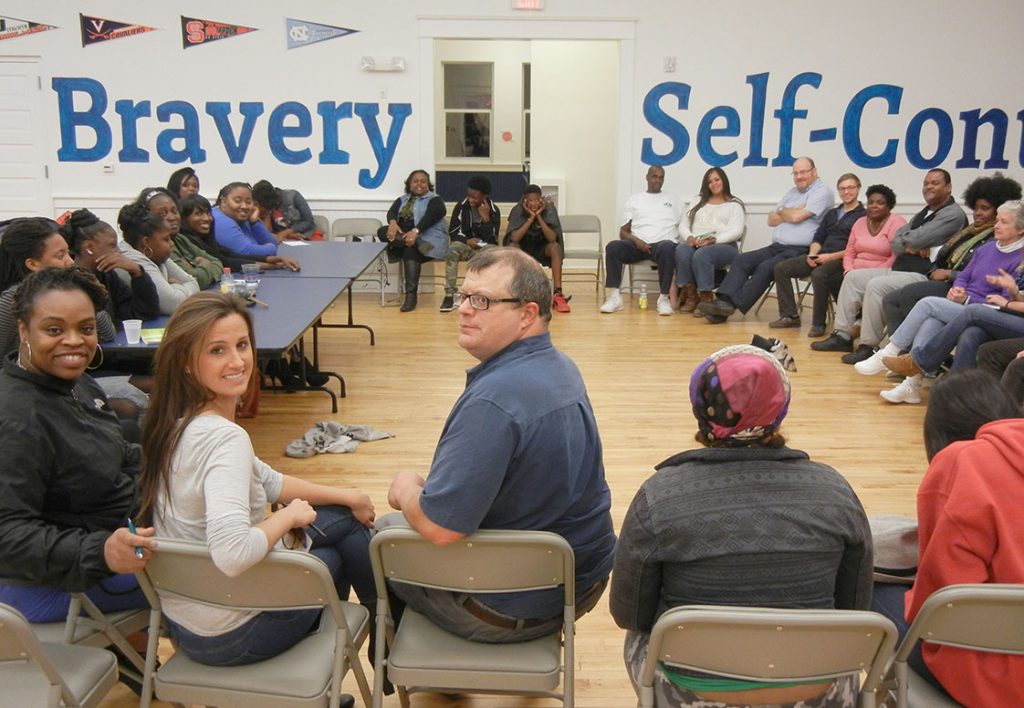
Circle leaders and allies meet Nov. 3 to discuss racial injustice and its effect on the distribution of wealth. Meetings are typically held at Antioch Baptist Church on Holloway Street. (Staff photo by Mark Lihn)
An initiative to help those in poverty fight it and its negative effects has come to Northeast Central Durham.
REAL (Relationships Equipping Allies and Leaders) Durham is a collaboration between a host of agencies: End Poverty Durham, Durham Congregations in Action, East Durham Children’s Initiative, Healthy Families Durham and the Durham Economic Resource Center, REAL Durham Coordinator Camryn Smith said.
REAL Durham is a part of the National Circles Campaign and will initially focus on East Durham.
Smith said the program is a relationship and development-based approach to poverty alleviation. Circle leaders, those fighting poverty, are grouped with circle allies, who are volunteers trained to support the leaders.
“Circle leaders are people who are seeking to come out of material poverty and to formulate relationships with people who are currently in some form of material or social privilege,” Smith said.
Veronica Terry is a circle leader who said she hopes the program will help her get off of government assistance and create better lives for her children. Terry is also the REAL Durham childcare coordinator.
Terry said the program will provide training in budgeting, work ethics and job preparedness. Terry started work with the program this past summer and has been active in Communities in Partnership Durham.
“I’m hoping to gain better skills to teach me how to really budget and not see myself in a place where I might need assistance,” Terry said. “Whereas now, like most of the other leaders, we are living below the poverty line, we are on some form of assistance.”
She said she helped to organize weekly summer readings and summer family nights on Fridays with activities that included movie and game nights with free dinners.
As childcare coordinator, Terry hires people to take care of the children while their parents, leaders and allies, are in their training sessions.
She has hired four teenagers in high school and wants four adult supervisors, she said. The program provides tutoring, arts and crafts, reading and a place for the older children to discuss current events.
Kelly Strickland, the coach for REAL Durham, oversees the training and support of circle leaders. Strickland said the program will work to improve the mental health of circle leaders by trying to reduce stress and increase financial and economic literacy.
Strickland said she came to the program in February and she has experience as a mental health therapist, where she worked one-on-one with people fighting poverty.
“I started to realize that a lot of our programs and initiatives were merely Band-Aids on the issue, the main root cause of why families were suffering and having so may health disparities and struggling to gain access to resources,” Strickland said.
The idea to start the organization came from a summit discussing childhood poverty in January 2013, Smith said.
Rev. Mel Williams, the co-founder of End Poverty Durham, and Smith then visited the circles program in Thomasville, N.C., with a few others. Smith said they liked what they saw and Williams asked her to be the coordinator of the program in Durham.
The program officially started in August 2013, but began its work in May 2014, Smith said.
Circle leader training, which lasts 15 weeks, began the first Monday of September, while ally training, which lasts 11 weeks, began the first Monday of October, she said. The entire program for a circle leader runs for a year as they are paired with allies after training.
Terry said she plans to continue her involvement in REAL Durham beyond her year as a circle leader.
“I hope to eventually become an ally so that the things I have learned and gained from it I can pass on to someone else,” Terry said.
Strickland said there are 14 circle leaders in the first group that began in September. She said they hope to have two groups of up to 15 leaders each year and the next group will probably start around February.
Strickland said there would ideally be four allies per leader, but there will be between two and four depending on the number of people who volunteer to be allies.